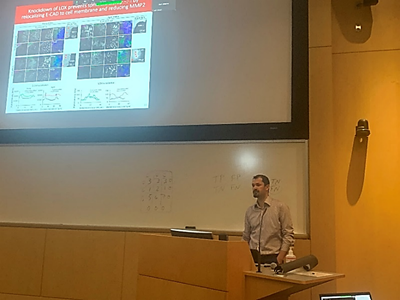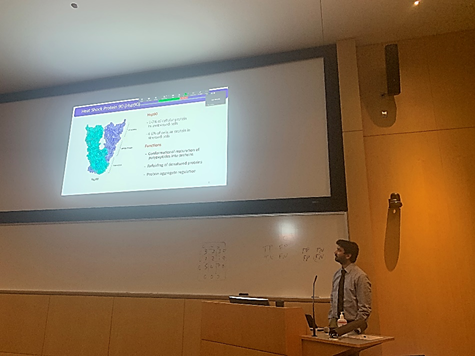Two post-doctoral fellows affiliated with the Harper Cancer Research Institute (HCRI) gave oral presentations as part of the 5th Annual Translational Bridge Symposium at the Robert H. Lurie Comprehensive Cancer Center in Chicago on November 12, 2021.
This program was initiated at Northwestern to foster collaborations between physicians and basic scientists to advance translational cancer research, with the ultimate goal of translating basic science discovery to the clinic. HCRI joined the initiative in 2020, providing the structure for an investigator affiliated with the HCRI and a partnering Lurie Cancer Center (LCC) clinician to co-mentor a Bridge Fellow. By facilitating close communication and cooperation between our institutions, our shared goal is to provide a valuable new opportunity to develop and apply novel research methods, tools, and technologies to improve treatment and impact outcomes for patients with cancer.
The inaugural LCC/HCRI Bridge Fellows were paired with clinician scientists at Northwestern chosen by Leonidas Platanias, MD, PhD, director of the Lurie Cancer Center in conjunction with Translational Bridge Program Leaders Daniela Matei, MD and Jindan Yu, MD, PhD. In addition to meeting with clinical mentors, Bridge Fellows have the opportunity to attend weekly OncoSET Molecular Tumor Boards hosted by Massimo Cristofanilli, MD. At these meetings, Bridge Fellows can discover how clinicians obtain and evaluate tumor molecular profiling data in conjunction with classical tumor pathology to more precisely guide treatment decisions involving molecularly targeted therapies.

Bridge Fellow Gokhan Bahcecioglu, PhD, a post-doctoral researcher with Professor Pinar Zorlutuna, PhD in the Department of Aerospace & Mechanical Engineering was jointly mentored by Dr. Cristofanilli on his project designed to understand the role of mammary gland aging in breast cancer progression. His symposium presentation, entitled "Aging ECM Drives Invasion in Normal and Cancer Mammary Epithelial Cells: Can Lysyl Oxidase Inhibitors be a Solution?" described his characterization of age-associated changes in the physical, biochemical, and mechanical properties of murine breast tissue and the interaction of both normal and malignant breast cells with these matrices. Promising translational work has identified lysyl oxidase as a potential therapeutic target. Dr. Bahcecioglu noted that “the symposium was very informative in that it included studies from various stages of the translational research spectrum, from basic research to animal studies to clinical trials” and he enjoyed the opportunity to obtain feedback from clinician-scientists.

“The program was enriching for me” was the opinion of Bridge Fellow Sanket Mishra, PhD, a post-doctoral researcher with Brian Blagg, PhD, Director of the Warren Family Center for Drug Discovery and Professor of Chemistry and Biochemistry. Advised by his clinical co-mentor, David VanderWeele, MD, PhD, Dr. Mishra pursued research related to designing therapeutic agents for bladder cancer. His Bridge Symposium presentation was entitled “Development of HSP90b-Selective Inhibitors as Safer Anti-Cancer Agents”. Dr. Mishra noted “It was very beneficial for me as a medicinal chemist to understand the clinician’s point of view regarding drug development and evaluation; particularly the design of clinical studies, enrollment criteria for patients, and understanding clinical endpoints.” Both Bridge Fellows also remarked that their clinical mentors were very accessible throughout the program.
While Dr. Bahcecioglu will continue in the program for a second year, Dr. Mishra will pursue other opportunities. We are eager to welcome Xiaozheng Dou, PhD, a post-doctoral researcher with the Blagg laboratory, to the 2021-2022 session of the program. Dr. Dou will be co-mentored by Northwestern clinician-scientist Yanis Boumber, MD, PhD on his project to design inhibitors of the F1/F0 ATPase, an Hsp90 co-chaperone molecule and evaluate its role in thoracic oncology.